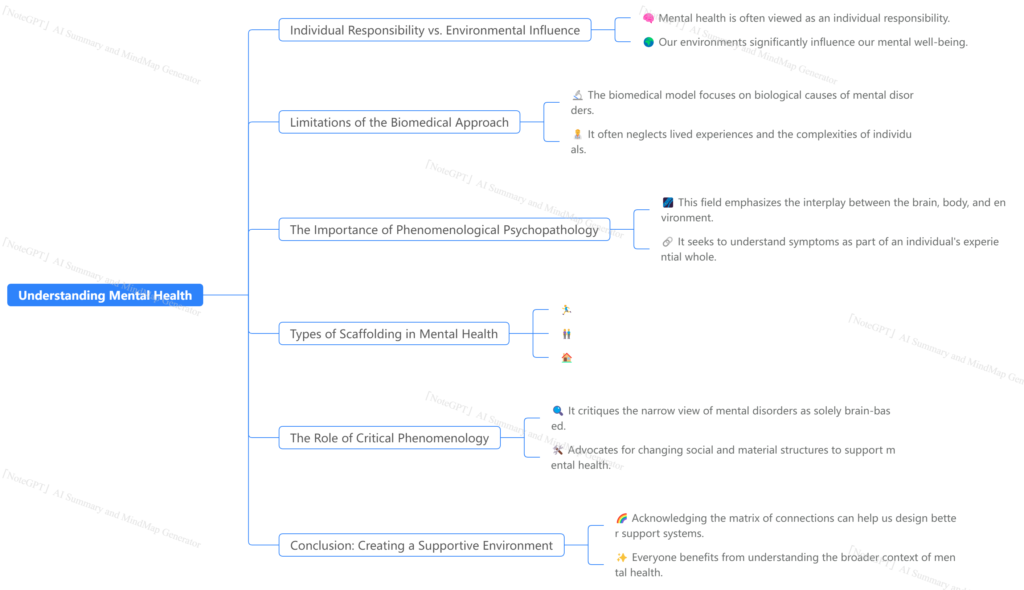
Contents
Summary
Mental health is influenced by personal choices and environmental factors, challenging the notion of individual responsibility alone.
Highlights
- 🌱 Mental health involves personal choices and lifestyle adjustments.
- 📚 The concept of “magical volunteerism” suggests we are solely responsible for our mental well-being.
- 🧠 Mental disorders are not just biological but also shaped by our experiences and environments.
- 🌍 Phenomenological Psychopathology emphasizes the interplay between brain, body, and the world.
- 🤝 Social interactions significantly influence mental health and well-being.
- 🛠️ Material objects can scaffold our emotions and mental states.
- 🔍 Critical phenomenology helps uncover the broader societal structures affecting mental health.
Key Insights
- 🌱 Personal Responsibility vs. Environmental Influence: While individual choices matter for mental health, the environment plays a critical role in shaping our experiences. This duality challenges the simplistic view of personal responsibility.
- 📚 Magical Volunteerism: This term critiques the belief that individuals bear full responsibility for their mental health, suggesting it can lead to harmful stigmatization and neglect of systemic issues.
- 🧠 Holistic Understanding of Mental Disorders: Mental disorders should be seen as complex interactions of brain functions and lived experiences, rather than mere biological malfunctions.
- 🌍 Phenomenological Psychopathology: This approach shifts focus from biological explanations to understanding how mental disorders relate to individual experiences within their environments.
- 🤝 Importance of Social Scaffolding: Our interactions with family, friends, and society profoundly affect our mental health, highlighting the need for supportive social structures.
- 🛠️ Material Scaffolding: Everyday objects influence our emotions. Understanding these interactions can help in managing mental health more effectively.
- 🔍 Critical Phenomenology’s Role: By examining the historical and societal contexts of mental disorders, we can work towards designing a more accommodating world that addresses these issues at their roots.
The Myth of Mental Illness
Understanding Mental Health
- 🧠 Mental health is influenced by both individual choices and environmental factors.
- 📚 The concept of “magical volunteerism” suggests that we are solely responsible for our mental well-being.
The Limitations of Biomedical Approaches
- 🏥 The biomedical model focuses primarily on brain function and biological causes of mental disorders.
- 🌀 It neglects the lived experiences and broader contexts affecting mental health.
Phenomenological Psychopathology
- 🔍 This approach examines the complex dynamics between the brain, body, and environment.
- 🌐 It emphasizes the importance of social and material scaffolding in understanding mental disorders.
- 🤝 Social scaffolding highlights the impact of interpersonal interactions on mental health.
- 🏢 Material scaffolding refers to how objects and environments influence psychological states.
The Role of Critical Phenomenology
- ⚖️ Critical phenomenology explores how historical and social structures contribute to mental health narratives.
- 🌈 It advocates for creating more inclusive environments that accommodate diverse mental health needs.
Conclusion: Restructuring Our Understanding
- 🌍 Recognizing the interconnectedness of brain, body, and world can improve mental health care.
- ❤️ Acknowledging and addressing the external factors affecting mental health fosters a more supportive society.



